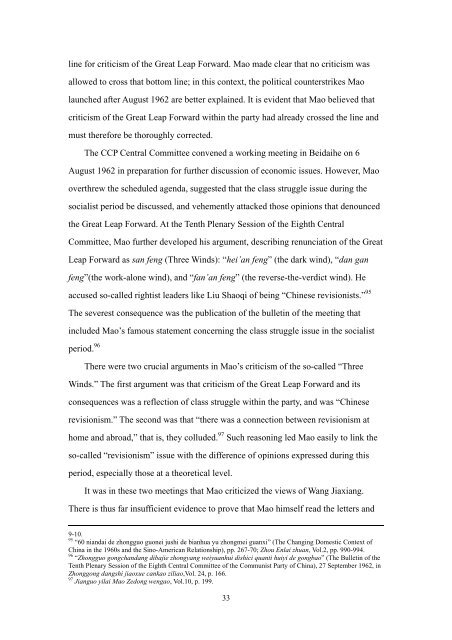1962: The Eve of the Left Turn in China's Foreign Policy - Claude Arpi
1962: The Eve of the Left Turn in China's Foreign Policy - Claude Arpi
1962: The Eve of the Left Turn in China's Foreign Policy - Claude Arpi
You also want an ePaper? Increase the reach of your titles
YUMPU automatically turns print PDFs into web optimized ePapers that Google loves.
l<strong>in</strong>e for criticism <strong>of</strong> <strong>the</strong> Great Leap Forward. Mao made clear that no criticism wasallowed to cross that bottom l<strong>in</strong>e; <strong>in</strong> this context, <strong>the</strong> political counterstrikes Maolaunched after August <strong>1962</strong> are better expla<strong>in</strong>ed. It is evident that Mao believed thatcriticism <strong>of</strong> <strong>the</strong> Great Leap Forward with<strong>in</strong> <strong>the</strong> party had already crossed <strong>the</strong> l<strong>in</strong>e andmust <strong>the</strong>refore be thoroughly corrected.<strong>The</strong> CCP Central Committee convened a work<strong>in</strong>g meet<strong>in</strong>g <strong>in</strong> Beidaihe on 6August <strong>1962</strong> <strong>in</strong> preparation for fur<strong>the</strong>r discussion <strong>of</strong> economic issues. However, Maooverthrew <strong>the</strong> scheduled agenda, suggested that <strong>the</strong> class struggle issue dur<strong>in</strong>g <strong>the</strong>socialist period be discussed, and vehemently attacked those op<strong>in</strong>ions that denounced<strong>the</strong> Great Leap Forward. At <strong>the</strong> Tenth Plenary Session <strong>of</strong> <strong>the</strong> Eighth CentralCommittee, Mao fur<strong>the</strong>r developed his argument, describ<strong>in</strong>g renunciation <strong>of</strong> <strong>the</strong> GreatLeap Forward as san feng (Three W<strong>in</strong>ds): “hei’an feng” (<strong>the</strong> dark w<strong>in</strong>d), “dan ganfeng”(<strong>the</strong> work-alone w<strong>in</strong>d), and “fan’an feng” (<strong>the</strong> reverse-<strong>the</strong>-verdict w<strong>in</strong>d). Heaccused so-called rightist leaders like Liu Shaoqi <strong>of</strong> be<strong>in</strong>g “Ch<strong>in</strong>ese revisionists.” 95<strong>The</strong> severest consequence was <strong>the</strong> publication <strong>of</strong> <strong>the</strong> bullet<strong>in</strong> <strong>of</strong> <strong>the</strong> meet<strong>in</strong>g that<strong>in</strong>cluded Mao’s famous statement concern<strong>in</strong>g <strong>the</strong> class struggle issue <strong>in</strong> <strong>the</strong> socialistperiod. 96<strong>The</strong>re were two crucial arguments <strong>in</strong> Mao’s criticism <strong>of</strong> <strong>the</strong> so-called “ThreeW<strong>in</strong>ds.” <strong>The</strong> first argument was that criticism <strong>of</strong> <strong>the</strong> Great Leap Forward and itsconsequences was a reflection <strong>of</strong> class struggle with<strong>in</strong> <strong>the</strong> party, and was “Ch<strong>in</strong>eserevisionism.” <strong>The</strong> second was that “<strong>the</strong>re was a connection between revisionism athome and abroad,” that is, <strong>the</strong>y colluded. 97 Such reason<strong>in</strong>g led Mao easily to l<strong>in</strong>k <strong>the</strong>so-called “revisionism” issue with <strong>the</strong> difference <strong>of</strong> op<strong>in</strong>ions expressed dur<strong>in</strong>g thisperiod, especially those at a <strong>the</strong>oretical level.It was <strong>in</strong> <strong>the</strong>se two meet<strong>in</strong>gs that Mao criticized <strong>the</strong> views <strong>of</strong> Wang Jiaxiang.<strong>The</strong>re is thus far <strong>in</strong>sufficient evidence to prove that Mao himself read <strong>the</strong> letters and9-10.95 “60 niandai de zhongguo guonei jushi de bianhua yu zhongmei guanxi” (<strong>The</strong> Chang<strong>in</strong>g Domestic Context <strong>of</strong>Ch<strong>in</strong>a <strong>in</strong> <strong>the</strong> 1960s and <strong>the</strong> S<strong>in</strong>o-American Relationship), pp. 267-70; Zhou Enlai zhuan, Vol.2, pp. 990-994.96 “Zhongguo gongchandang dibajie zhongyang weiyuanhui dishici quanti huiyi de gongbao” (<strong>The</strong> Bullet<strong>in</strong> <strong>of</strong> <strong>the</strong>Tenth Plenary Session <strong>of</strong> <strong>the</strong> Eighth Central Committee <strong>of</strong> <strong>the</strong> Communist Party <strong>of</strong> Ch<strong>in</strong>a), 27 September <strong>1962</strong>, <strong>in</strong>Zhonggong dangshi jiaoxue cankao ziliao,Vol. 24, p. 166.97 Jianguo yilai Mao Zedong wengao, Vol.10, p. 199.33

















